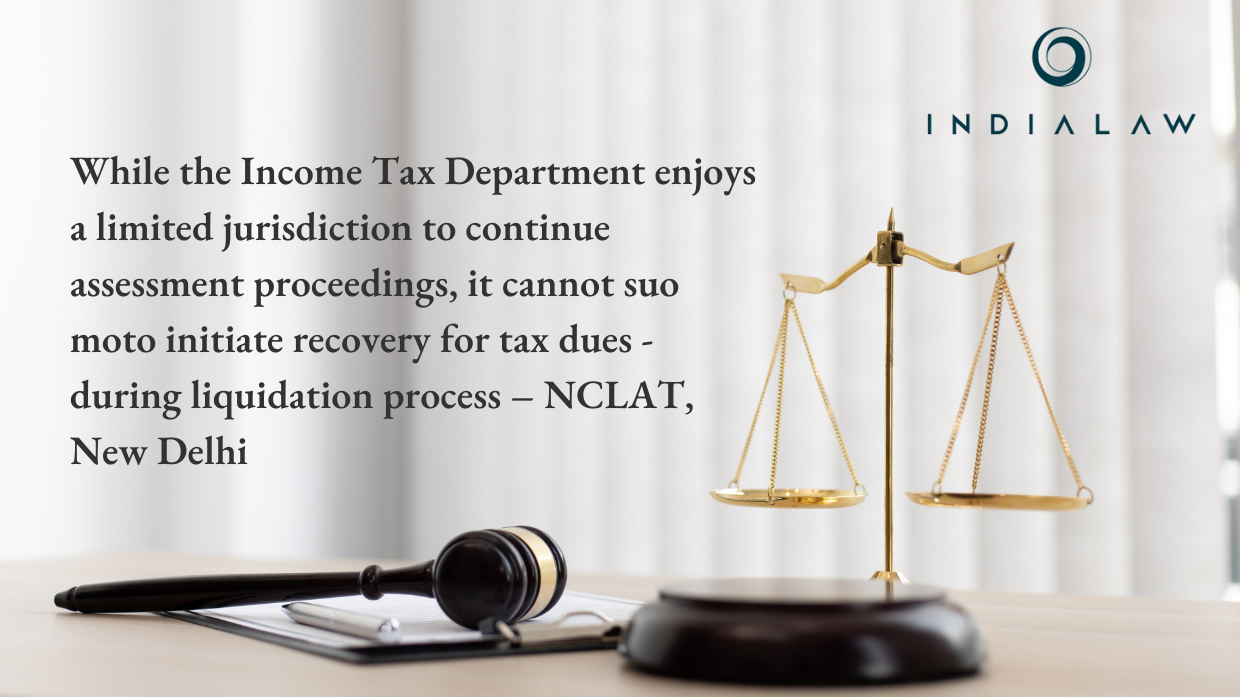While the Income Tax Department enjoys a limited jurisdiction to continue assessment proceedings, it cannot suo moto initiate recovery for tax dues – during liquidation process – NCLAT, New Delhi

Avil Menezes, Liquidator of Sunil Hitech and Engineers Limited Vs. Principal Chief Commissioner of Income Tax, Mumbai
Introduction:-
In the case of Avil Menezes (Liquidator) v. Principal Chief Commissioner of Income Tax, Mumbai[1], The Hon’ble NCLAT held that Section 33(5) does not restrict the continuation of pending suits or proceedings against the Corporate Debtor. It also held that the Income Tax Department enjoys the partial jurisdiction with continuing assessment proceedings and determining the quantum of due Income Tax but, it does not have the power to Suo moto initiate recovery for the same without filing a claim with the Liquidator.
Table of Contents
Facts :-
The Corporate Debtor was admitted into Liquidation by the adjudicating authority on 25.06.2019. The Appellant was appointed as the liquidator. On the examination of the “Annual Information statement” (AIS) by the Liquidator, it was noticed that the Corporate Debtor was entitled to receive Income Tax Refund (ITR) amounting to Rs. 5.84 Cr. along with interest of Rs. 11.46 lakhs for the A. Y. 2021-2022. It was further noticed that the same amount was adjusted on 12.11.2021 by the Respondent against the Income Tax demand for the A.Y. 2010-2011 and A.Y. 2011-2012. Similarly, some amount of ITR was to be received for the A.Y. 2020-2021 which was adjusted against pre-CIRP dues. Aggrieved by this, Appellant filed an application before the adjudicating authority seeking return of Income Tax refund amount which was dismissed. The Appellant filed an Appeal challenged the impugned order.
Contentions of the Parties:
The Appellant contended that in terms of section 36(3)(b) of the IBC, assets which are may or may not be in the possession of the Debtor also constitute to be a part of the Liquidation estate. Thus, the ITR amount available with the Respondents should be part of the Liquidation estate. Reliance was placed on the judgment of NCLAT in Devarajan Raman v. Principal Commissioner Income Tax, (Mumbai-1)[2]. It was also contended that the recovery of tax dues under Section 245 of the Income Tax Act was incorrect and illegal as per the moratorium under Section 33(5). While asserting that the Respondent was an Operational Creditor, it was contended that the Respondent was required to file a claim with the Liquidator and could not have suo moto adjusted the tax dues. The Counsel for appellant further contended that the any adjustment to ITR had to done by following the due process as laid down under IBC. It was further contented that having a right to set-off ipso facto does not create a charge.
The counsel for Respondent contended that the dues of the Income Tax come under the ambit of security interest. Reliance was placed on a NCLAT judgment in Principal Commissioner of Income Tax and others v. M/s Assam Company ltd[3] (“Assam Company” in short), to assert that Respondent was a secured creditor. It was further contended that since, the Respondent had security interest as under section 245(1) of IT Act, Section 238 of IBC was inapplicable.
Decision of the court
Permissibility of continuation of pending proceedings after Liquidation order have been passed:
After perusal of the Section 14 and Section 33 of IBC, NCLAT noted that Moratorium under Section 14 apply to CIRP whereas moratorium under section 33 applies to Liquidation process. Section 14 explicitly prohibits both institution and continuation of pending suits or proceedings. On the other hand, Section 33(5) only prohibits institution of new suits/proceedings. Hon’ble NCLAT held that unlike in Section 14(4), there was no specific embargo against continuation of Suits/proceedings during the Liquidation process under section 33(5). Thus, it concluded that the Respondent was legally entitled to continue the assessment proceedings during the liquidation process.
Is the Respondent a secured creditor having a security interest under section 245(1) of the IT Act?
By placing the reliance on Assam Company supra, it was contended that Respondent being a government authority is a secured creditor. NCLAT observed that in the said judgment, reliance was place on the Supreme Court Judgment in State Tax Officer v. Rainbow Papers Ltd[4]. NCLAT held that the judgment did not assist the contention as in the judgment of Paschimanchal Vidyut Vitran Nigam Ltd. V. Raman Ispat Pvt. Ltd. & ors. [5], the ratio of Rainbow Papers supra has to be confined to the facts of the case where the Operational Creditor was considered as a secured creditor on basis of relevant statutory provisions. No such provision including Section 245 of IT Act creates any charge or security interest in favour of Respondents. Thus, it held that adjudicating authority erred in holding that the Respondent has acquired security interest under Section 245(1).
Infirmity in the action of Respondent in appropriation of ITR amount and in setting-off the amount against the tax-arrears.
NCLAT observed that there was no restriction, embargo on the principle of set-off during the Liquidation process. The right of set-off is available to the Respondent as per the Regulation 29 of Liquidation Regulation. It was observed that the concept of set-off is based on the premise of mutual credits and dealings between the parties. It further held that Raman judgment supra did not apply due to distinction between facts in the present case and the case of Raman judgment. Thus, the contention of the Appellant that the entire ITR amount was part of the liquidation estate was rejected.
It was observed that In Sundaresh Bhatt, Liquidator of ABG Shipyard v. Central Board of Indirect Taxes and Customs[6] , Hon’ble Supreme Court held that statutory authority could take steps to ascertain due tax, interest, fine or penalty, but it cannot enforce a claim of recovery during moratorium. Extending the ratio, NCLAT held that income tax authority enjoys limited jurisdiction of continuing with assessment proceedings but it does not have the necessary jurisdiction and power to suo moto initiate recovery of dues or execute their claim by the virtue of set-off.
Additionally, it was observed that filing of set-off claims was mandatory as per the Liquidation Regulations and cannot be bypassed.
Based on the following observations, the Hon’ble NCLAT noted that there was a clear infirmity on the part of the Respondents in unilaterally and suo-moto appropriating the ITR amount by setting-off the amount against the past dues.
[1] Company Appeal (AT) (Insolvency) No. 258 of 2024.
[2] Company Appeal (AT) (Insolvency) No. 977 of 2023.
[3] Company Appeal (AT)(Insolvency) No. 241 of 2022.
[4] Civil Appeal No. 1661 of 2020.
[5] Civil Appeal No. 7976 of 2019.
[6] Civil Appeal No. 7667 of 2021.
By entering the email address you agree to our Privacy Policy.



